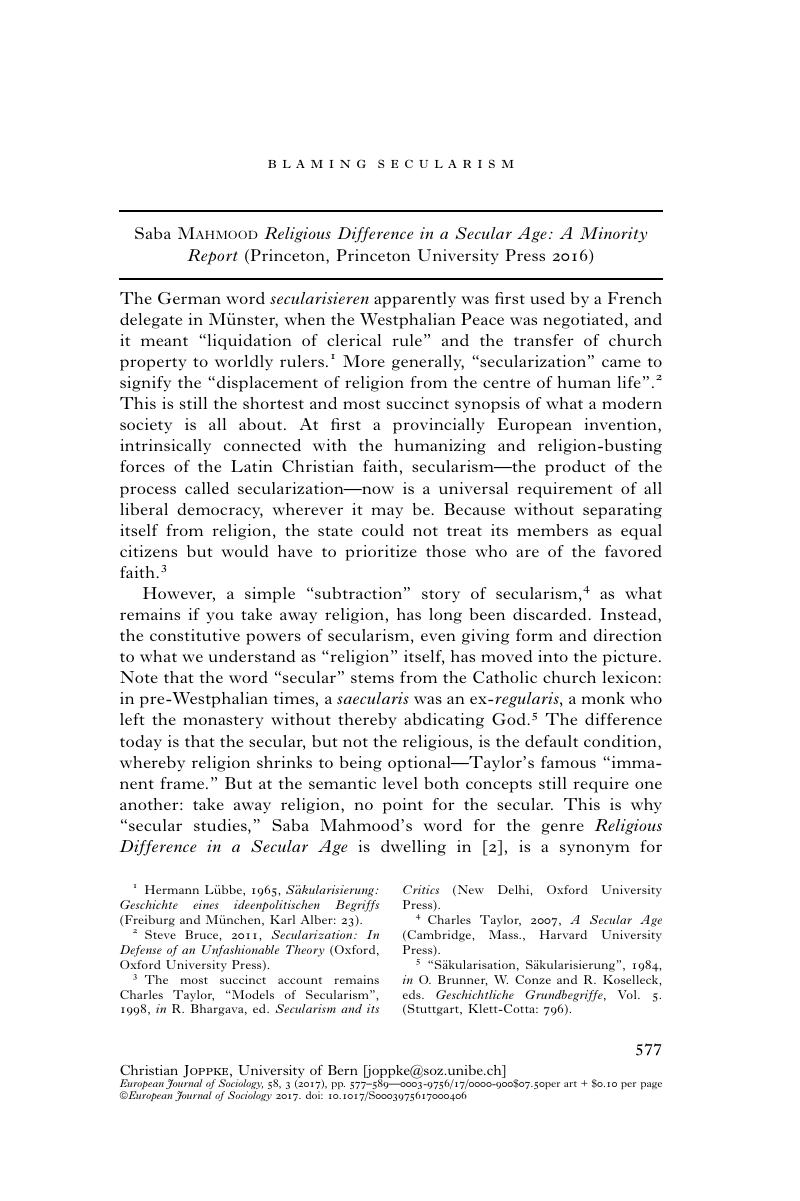Published online by Cambridge University Press: 04 December 2017

1 Hermann Lübbe, 1965, Säkularisierung: Geschichte eines ideenpolitischen Begriffs (Freiburg and München, Karl Alber: 23).
2 Steve Bruce, 2011, Secularization: In Defense of an Unfashionable Theory (Oxford, Oxford University Press).
3 The most succinct account remains Charles Taylor, “Models of Secularism”, 1998, in R. Bhargava, ed. Secularism and its Critics (New Delhi, Oxford University Press).
4 Charles Taylor, 2007, A Secular Age (Cambridge, Mass., Harvard University Press).
5 “Säkularisation, Säkularisierung”, 1984, in O. Brunner, W. Conze and R. Koselleck, eds. Geschichtliche Grundbegriffe, Vol. 5. (Stuttgart, Klett-Cotta: 796).
6 Talal Asad, 2003, Formation of the Secular: Christianity, Islam, Modernity (Stanford, Stanford University Press).
7 Alfred Stepan, 2001 Arguing Comparative Politics (New York, Oxford University Press: ch. 11).
8 See Max Rheinstein, 1974, “The Family and the Law”, International Encyclopedia of Comparative Law, Vol. 4 (edited by A. Chloros, M. Rheinstein, and M.A. Glendon (Tübingen, Mohr Siebeck: 8f).
9 Mary Ann Glendon, 1989, The Transformation of Family Law. (Chicago, University of Chicago Press: 14).
10 See also Karuna Mantena and Aziz Rana, “Democracy and the Secular Predicament”, The Immanent Frame, posted on 22 March 2016 (http://blogs.ssrc.org/tif/2016/03/22/democracy-and-the-secular-predicament).
11 Paul Lagarde, 2010,“Reference to Public Order (‘Ordre Public’) in French Private International Law”, in M.C. Foblets et al., eds. Cultural Diversity and the Law (Brussels, Bruylant and Editions Yvon Blais: 545f).
12 The Egyptian Court of Cassation (1979), quoted in Hussein Ali Agrama, 2010, “Secularism, Sovereignty, Indeterminacy: Is Egypt a Secular or a Religious State?”, Comparative Studies in Society and History, 52 (3): 495-523, at 506.
13 Baber Johansen, 2003, “Apostasy as Objective and Depersonalized Fact”, Social Research, 70 (3): 687-710, at 692.
14 Ibid.: 690.
15 Ibid.: 700.
16 Ibid.: 698.
17 Patrick Devlin, 1963, The Enforcement of Morals (Oxford, Oxford University Press: 15).
18 For the “religious pluralism” aspect of Lautsi, see Christian Joppke, 2013, “A Christian Identity for the Liberal State?”, British Journal of Sociology, 64 (4): 597-616.
19 1 BvR 471/10 and 1 BvR 1181/10, decision 27 January 2015: 123.
20 Matthias Koenig, 2015, “The Governance of Religious Diversity at the European Court of Human Rights”, in J. Boulden and W. Kymlicka, eds., International Approaches to Governing Ethnic Diversity (New York, Oxford University Press: 72).
21 ECtHR, Case of S.A.S. v. France, 1 July 2014: 122.